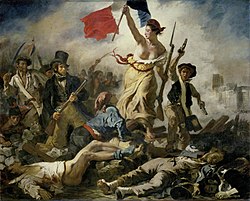| Part of a series on |
| Political revolution |
|---|
 |
|
|
A revolutionary wave (sometimes revolutionary decade) is a series of revolutions occurring in various locations within a particular timespan. In many cases, past revolutions and revolutionary waves have inspired current ones, or an initial revolution has inspired other concurrent "affiliate revolutions" with similar aims.[1][2] The causes of revolutionary waves have become the subjects of study by historians and political philosophers, including Robert Roswell Palmer, Crane Brinton, Hannah Arendt, Eric Hoffer, and Jacques Godechot.[3]
Writers and activists, including Justin Raimondo and Michael Lind, have used the phrase "revolutionary wave" to describe discrete revolutions happening within a short time-span.[4][5][6]
- ^ Mark N. Katz, Revolution and Revolutionary Waves, Palgrave Macmillan (October 1, 1999)
- ^ Nader Sohrabi, Revolution and Constitutionalism in the Ottoman Empire and Iran, Cambridge University Press, 2011 pp. 74, 83, 87, 90, 94, 96, ISBN 0-521-19829-1, ISBN 978-0-521-19829-5
- ^ *Colin J. Beck, Dissertation submitted to Stanford University Department of Sociology graduate Ph.D program, March 2009, "Ideological roots of waves of revolution," ProQuest, 2009, pp. 1-5[permanent dead link], ISBN 1-109-07655-X, 9781109076554.
- Note: Colin J. Beck also wrote The Ideological Roots of Waves of Revolution, BiblioBazaar, 2011, ISBN 1-243-60856-0, 9781243608567
- ^ Justin Raimondo, "The Revolutionary Wave: Tunisia, Egypt, Yemen – is the West next?", Antiwar.com, January 28, 2011 - "The revolutionary wave now sweeping the world will not exempt America, in spite of the myth of 'American exceptionalism.'".
- ^ Frank B. Tipton, A history of modern Germany since 1815, University of California Press, 2003, p. 82, ISBN 0-520-24049-9, ISBN 978-0-520-24049-0 Chapter 3: A Revolutionary Generation: The 1840s and the Revolutions of 1848 - "A rising revolutionary wave?"
- ^ Michael Lind, Vietnam, the Necessary War: A Reinterpretation of America's Most Disastrous Military Conflict, Simon and Schuster, 2002 p 37 ISBN 0-684-87027-4, ISBN 978-0-684-87027-4 - "The revolutionary wave effect produced by the fall of Saigon in 1975 was far more significant than the regional domino effect in Southeast Asia proper. [...] Mark N. Katz has identified a 'Marxist-Leninist revolutionary wave' that peaked in the 1960s and 1970s, along with an 'Arab nationalist revolutionary wave' that began with the [1978-1979] Iranian Revolution. Samuel P. Huntington has identified a 'democratic wave' that began with the defeat of the Soviet bloc in the Cold War. [...] The Marxist-Leninist revolutionary wave associated with the Vietnam War saw 'affiliate Marxist-Leninist revolutions' come to power outside of Indochina in the Congo (1964, 1968), Benin (1972), Ethiopia and Guinea-Bissau (1974), Madagascar, Cape Verde, Mozambique, and Angola (1975), Afghanistan (1978), and Grenada and Nicaragua (1979)."